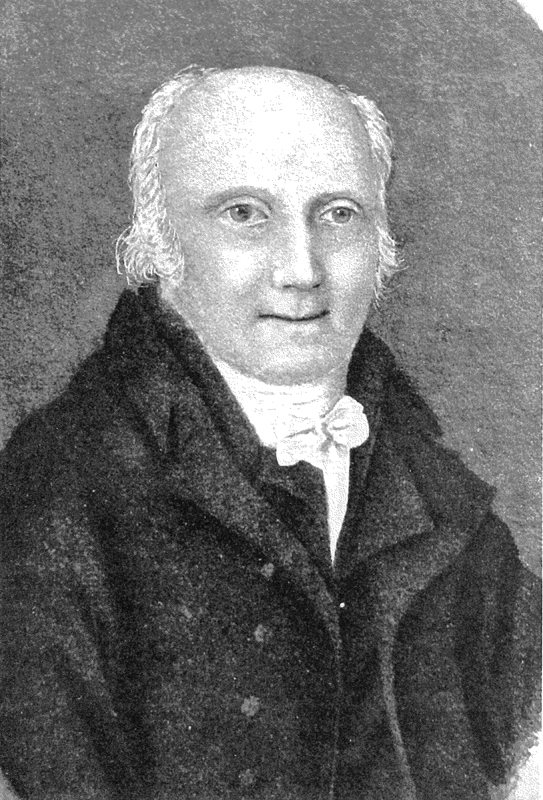Difference between revisions of "William DuVal"
m |
|||
| (3 intermediate revisions by 2 users not shown) | |||
| Line 18: | Line 18: | ||
|relatives= | |relatives= | ||
|knownfor=Studied law under [[George Wythe]]<br />Executor of Wythe's will | |knownfor=Studied law under [[George Wythe]]<br />Executor of Wythe's will | ||
| − | }} | + | }}William DuVal (1748 – 1842), known as Major DuVal, was a prominent Virginia lawyer and a friend and neighbor of [[George Wythe]] during the latter's residence in Richmond, Virginia.<ref>Bessie Berry Grabowskii, ''The DuVal Family of Virginia, 1701: Descendants of Daniel DuVal, Huguenot and Allied Families'', (Richmond, Va.: Press of the Dietz Printing Co, 1931), 186.</ref> Born and raised in Richmond, DuVal served in the armed forces during the Revolution, and then studied law in Philadelphia and at [https://www.wm.edu/ William & Mary College],<ref>Grabowskii, 189.</ref> presumably as one of Wythe's students. In December 1789 when the first federal district court commenced proceedings, DuVal was among the first four men admitted to practice before the court—along with [[John Marshall]], [[James Innes]], and German Baker.<ref>Grabowskii, 190.</ref> Governor John Page also appointed the major to a position as a ward commissioner in the city of Richmond. |
| − | William DuVal (1748 – 1842), known as Major DuVal, was a prominent Virginia lawyer and a friend and neighbor of [[George Wythe]] during the latter's residence in Richmond, Virginia.<ref>Bessie Berry Grabowskii, ''The DuVal Family of Virginia, 1701: Descendants of Daniel DuVal, Huguenot and Allied Families'', (Richmond, Va.: Press of the Dietz Printing Co, 1931), 186.</ref> Born and raised in Richmond, DuVal served in the armed forces during the Revolution, and then studied law in Philadelphia and at [ | + | |
| − | |||
DuVal's home at the corner of Sixth and Grace streets sat diagonally opposite to the home of [[George Wythe]].<ref>Grabowskii, 191</ref> DuVal acted as his neighbor's lawyer and served as the executor of [[Last Will and Testament|Wythe's will]]. In this capacity, the responsibility fell to DuVal to inform [[Thomas Jefferson]] of their friend's last illness and subsequent [[Death of George Wythe|death]]. Jefferson and DuVal [[Jefferson-DuVal Correspondence|corresponded]] over the course of six months in 1806 discussing the disposition of Wythe's bequests and their mutual admiration for their fallen friend. | DuVal's home at the corner of Sixth and Grace streets sat diagonally opposite to the home of [[George Wythe]].<ref>Grabowskii, 191</ref> DuVal acted as his neighbor's lawyer and served as the executor of [[Last Will and Testament|Wythe's will]]. In this capacity, the responsibility fell to DuVal to inform [[Thomas Jefferson]] of their friend's last illness and subsequent [[Death of George Wythe|death]]. Jefferson and DuVal [[Jefferson-DuVal Correspondence|corresponded]] over the course of six months in 1806 discussing the disposition of Wythe's bequests and their mutual admiration for their fallen friend. | ||
| Line 28: | Line 27: | ||
*[[Jefferson-DuVal Correspondence]] | *[[Jefferson-DuVal Correspondence]] | ||
*[[Last Will and Testament]] | *[[Last Will and Testament]] | ||
| + | *[[Wythe's Lost Papers]] | ||
| + | *[[Wythe the Teacher]] | ||
==References== | ==References== | ||
Latest revision as of 11:21, 7 June 2024
| William DuVal | |
| Personal details | |
| Born | April, 1748 |
| Mt. Comfort, Virginia | |
| Died | January 3, 1842 |
| Buckingham County, Virginia | |
| Profession | Lawyer Businessman |
| Spouse(s) | Ann Pope Susan Brown Christian |
| Known for | Studied law under George Wythe Executor of Wythe's will |
William DuVal (1748 – 1842), known as Major DuVal, was a prominent Virginia lawyer and a friend and neighbor of George Wythe during the latter's residence in Richmond, Virginia.[1] Born and raised in Richmond, DuVal served in the armed forces during the Revolution, and then studied law in Philadelphia and at William & Mary College,[2] presumably as one of Wythe's students. In December 1789 when the first federal district court commenced proceedings, DuVal was among the first four men admitted to practice before the court—along with John Marshall, James Innes, and German Baker.[3] Governor John Page also appointed the major to a position as a ward commissioner in the city of Richmond.
DuVal's home at the corner of Sixth and Grace streets sat diagonally opposite to the home of George Wythe.[4] DuVal acted as his neighbor's lawyer and served as the executor of Wythe's will. In this capacity, the responsibility fell to DuVal to inform Thomas Jefferson of their friend's last illness and subsequent death. Jefferson and DuVal corresponded over the course of six months in 1806 discussing the disposition of Wythe's bequests and their mutual admiration for their fallen friend.
DuVal died at his plantation in Buckingham County on January 3, 1842 at the age of 94.[5]
